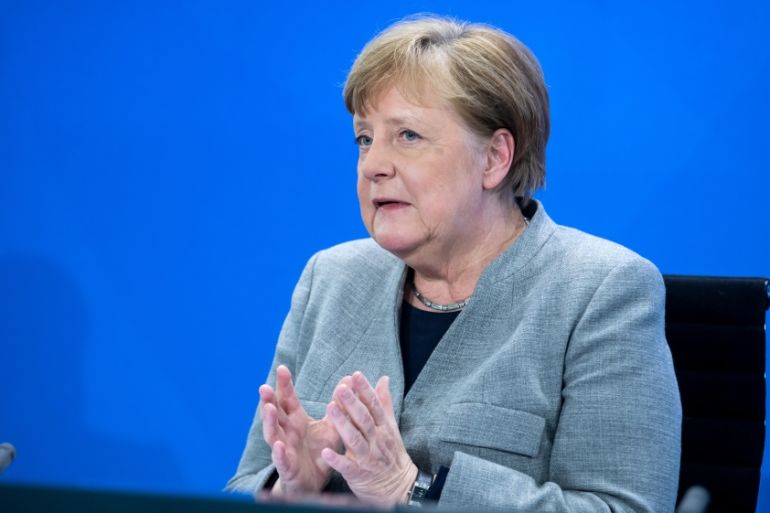Germany to begin easing coronavirus shutdown: Merkel
Chancellor announces steps in reversing lockdowns amid ‘fragile, partial success’ but stresses ‘extreme caution’ needed.

German Chancellor Angela Merkel has announced the first steps in undoing coronavirus lockdowns in the coming weeks, stressing, however, that the measures had only achieved a “fragile, partial success” against the pandemic.
Stores up to 800 square metres (8,600 square feet) will be allowed to reopen once they have “plans to maintain hygiene”, Merkel said on Wednesday following talks with the leaders of Germany’s 16 federal states.
Keep reading
list of 3 itemsNew coronavirus outbreak: Facts and myths
Coronavirus: Which countries have confirmed cases?
The chancellor said the government recommended citizens to wear protective face masks while shopping and on public transport.
Physical distancing rules to contain the spread of the coronavirus would remain in place until at least May 3, while schools across the country would be allowed to open gradually, starting from May 4, with priority given to pupils about to take exams.
Meanwhile, a ban on large public events will be upheld until August 31 to prevent possible mass transmissions of the virus, which causes a highly infectious respiratory disease called COVID-19.
Merkel said Germans should still exercise “extreme caution” and asked them to keep to the anti-coronavirus measures imposed by the government.
Germany has 132,718 confirmed coronavirus cases to date, including 3,592 deaths, according to data compiled by Johns Hopkins University.
Recession
Also on Wednesday, Germany’s economy ministry said the recession that started in the country in March was set to last until the middle of the year.
“Falling global demand, interruption of supply chains, changes in consumers’ behaviour and uncertainty among investors” had all made themselves felt, the ministry of Europe’s largest economy said.
|
|
The economic blow from the virus fell just as Germany was beginning to recover from 2019, a year marked by the effects of trade wars and fears over the effect of the United Kingdom’s departure from the European Union.
Industry, in particular, had seen rises in new orders and activity as 2020 got under way, the ministry said.
But “given the massive demand and supply shock at home and abroad from the coronavirus pandemic, economic developments reversed course” for manufacturers, it added.
Chafing at the physical distancing rules, some Germans have pointed to neighbouring Austria, where Chancellor Sebastian Kurz allowed many smaller businesses to reopen from Tuesday – but with conditions such as wearing masks and maintaining a safe distance from others.
“Even if the first protective measures can be loosened somewhat (after April), growth will remain very muted and only revive bit by bit,” the economy ministry forecast.
To cushion some of the blow, Berlin has passed a rescue package totalling 1.1 trillion euros ($1.2 trillion), ranging from guarantees for bank lending to business to a state fund that could buy up stakes in stricken companies if necessary.
The federal government also eased access to a scheme that tops up workers’ wages if their employer slashes hours.
The BA federal labour agency said about 725,000 companies had applied for the assistance, adding that the number of workers affected will likely be “significantly” above the 1.4 million helped in the 2008-2009 financial crisis.
Berlin estimates that about 2.1 million workers will have to fall back on the support.
Eurozone
Meanwhile, eyes are on an EU heads of government video conference on April 23 to lay the groundwork for recovery across the bloc.
Finance ministers from the eurozone single currency area agreed 500 billion euros ($458bn) of immediate support last week, but economists and politicians warn more will be needed, especially for the hardest-hit southern nations like Spain and Italy.
Predicting a contraction of up to 5.4 percent for Germany this year, some among Berlin’s council of economic advisers (SVR) warned in March of consequences if a European recovery programme falls short.
“It’s not much good if one country, hopefully Germany, comes through the crisis relatively well, but around us the crisis is not yet over, then we won’t be able to ramp up production,” SVR member Achim Trueger said at the time.